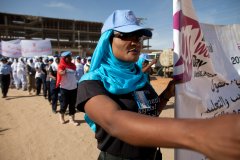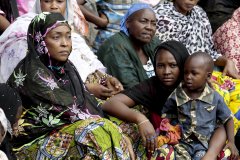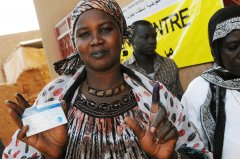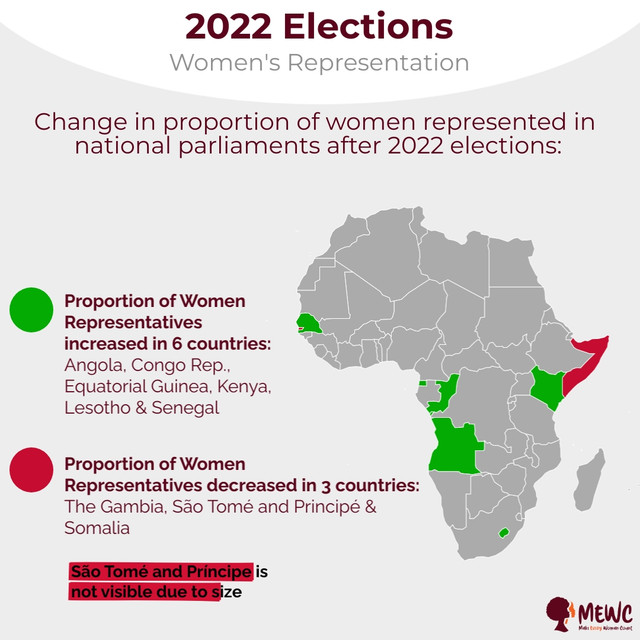Gender Issues Showlist
Women, Peace & Security
UNSCR 1325 calls on all parties to: protect and respect the rights of women and girls in conflict & post-conflict; increase women participation in all conflict resolution, peacekeeping and peace-building & to end impunity by prosecuting perpetrators of sexual and other violence on women and girls
index.php?option=com_content&view=category&id=56&Itemid=1913
Human Rights of Women
Thirty six years after the adoption of CEDAW, many women and girls still do not have equal opportunities to realize rights recognized by law. Women are denied the right to own property or inherit land. They face social exclusion, “honor killings”, FGM, trafficking, restricted mobility, early marriage,...
index.php?option=com_content&view=category&id=44&Itemid=1908
Violence Against Women
Violence against women is the most shameful human rights violation. Gender based violence not only violates human rights, but also hampers productivity, reduces human capital and undermines economic growth. It is estimated that up to 70 per cent of women experience violence in their lifetime
index.php?option=com_content&view=category&id=69&Itemid=1912
Political Participation & Leadership
Where women are fully represented, societies are more peaceful and stable. Women political participation is fundamental for gender equality and their representation in positions of leadership must be a priority for all Africans governments.
index.php?option=com_content&view=category&id=65&Itemid=1911
Latest News
- COTE D'IVOIRE: South-South Meeting to Promote Gender Equality and Combat Deforestation
- RWANDA: Rwanda Set to Launch Cervical Cancer Elimination Plan
- NIGERIA: Over 5,000 Nigerian Women Stranded in Iraq - Govt
- SUDAN: Healthcare Collapse Threatens Pregnant Women in Sudan's Sharg El Nil
- GHANA: President Nominates 12 More Ministers
- Senegal: Parliamentary election 2024
- Mauritius: Parliamentary election 2024
- Ghana: Presidential and Parliamentary Elections
- Botswana: Parliamentary elections 2024
- Algeria: Presidential Election 2024
Sudan: Darfur Student Convicted of Inappropriate Dress 'Abused in Prison'
Source: AllAfrica
Khartoum — The Public Order Court of Al Sug Al Mahalli in the Sudanese capital of Khartoum, on Wednesday ordered that a female student from Darfur should pay a fine of SDG1,000 ($230) or spend a month in prison for wearing "inappropriate clothes". The student alleges that she was "abused" while in detention.
Alia Abdou was arrested on a main street in Khartoum and taken to the public order police prison in Al Daim. She claims that while in pre-trial detention, she was abused, beaten and had her clothes confiscated.
In a statement to Radio Dabanga on Thursday, the Darfur Bar Association said Abdou was convicted based solely on the testimony of the complainant and his witness. The allegedly inappropriate clothing was not displayed as evidence,
The statement says that Abdou demanded her clothing be returned after the trial, but this was refused and the clothes were taken to be burned. "The complainant proved ignorant of what constituted 'inappropriate dress' in terms of the public order." The Bar association branded the conviction against Abdou "illegal".
"It is a continuation of prosecutions that target people who live on the margins of Sudanese society," the statement said. "Especially women are vulnerable to insults and humiliation, and this will lead to an imbalance and accelerated fragmentation of social cohesion."
The statement continued that conducting persecution under the guise of 'public order' is contrary to the norms and objectives of the Islamic religion.
"The daughters and wives of state officials wear trousers of various sizes and patterns, without being subjected to such prosecutions. This proves double standards and abuse of the law," the statement concludes.





